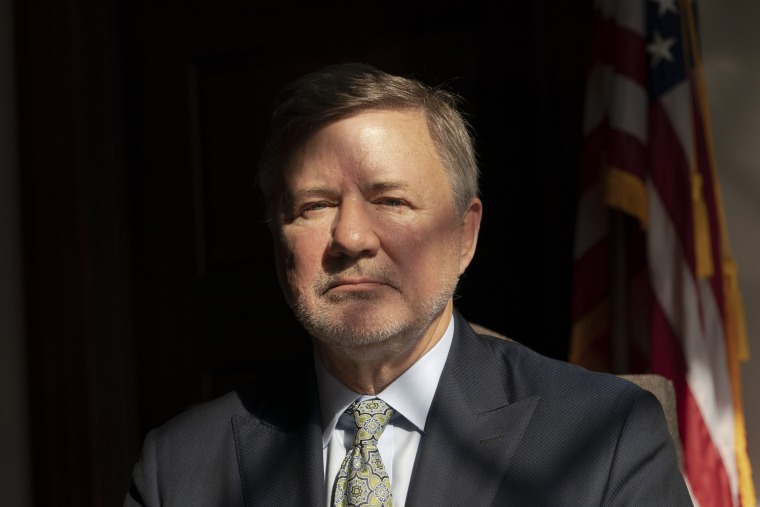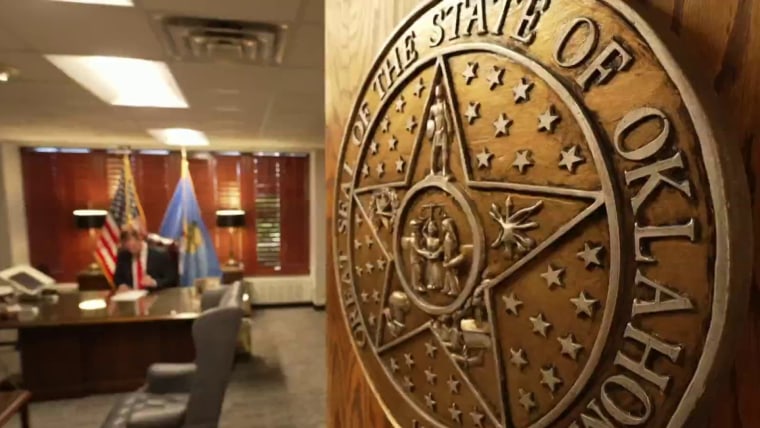WASHINGTON — Conservative members of the Supreme Court on Wednesday leaned toward allowing Oklahoma to approve the first-ever religious public charter school in a case that could weaken the separation of church and state.
While several conservative justices expressed support for the school's arguments, Chief Justice John Roberts emerged during the more than two-hour argument as a potentially decisive vote.
There is the possibility of a 4-4 split, as one justice, conservative Amy Coney Barrett, is not participating. That outcome would preserve an Oklahoma Supreme Court ruling that blocked the proposed school.
Follow live politics coverage here
Although the oral argument concerned only St. Isidore of Seville Catholic Virtual School, which would operate online throughout the state with a remit to promote the Catholic faith, the case could have broad ramifications.
The dispute, which pits Republicans in Oklahoma against each other, highlights tensions within the Constitution's First Amendment. While the Establishment Clause prohibits state endorsement of religion or preference for one religion over another, the Free Exercise Clause outlaws religious discrimination.
Lawyers for St. Isidore, who are defending the proposal along with the Oklahoma Statewide Charter School Board, have a narrow interpretation of the Establishment Clause and say barring religious entities from applying to run charter schools would run afoul of the Free Exercise Clause.
The Archdiocese of Oklahoma City and the Diocese of Tulsa jointly proposed the school.
In recent years, the Supreme Court has repeatedly strengthened the Free Exercise Clause in cases brought by conservative religious liberty activists, sometimes at the expense of the Establishment Clause. Some conservatives have long complained that the common understanding that the Establishment Clause requires strict separation of church and state is flawed.
Conservative justices expressed doubt that charter schools are public schools that are effectively instruments of the state and favored the school's argument that they are entirely private bodies that just happen to receive state funding.
They also expressed concern that it would be a form of religious discrimination under the Free Exercise Clause to bar religious schools from a state charter school program that other entities can participate in.
"Our cases have made very clear, those are some of the most important cases we've had, saying you can't treat religious people, religious institutions and religious speech as second class in the United States," conservative Justice Brett Kavanaugh said.
To prohibit religious entities from participating in a program open to everyone else would be "rank discrimination," he added.
Fellow conservative Justice Samuel Alito took issue with some of the statements made by Oklahoma Attorney General Gentner Drummond, who challenged the decision to approve the school and was sitting in the courtroom.
Alito mentioned that Drummond has said that a ruling for St. Isidore would pave the way for Islamic schools, which he characterized as evidence of "hostility toward particular religions."

Roberts was more measured than some of his conservative colleagues, asking skeptical questions of both sides. But in one exchange, he seemed to think the case echoed a 2021 ruling in which the Supreme Court ruled in favor of a Catholic group that was barred from participating in Philadelphia's foster care program because of its religious views opposing same-sex relationships.
"How is that different from what we have here?" he asked. "You have an education program and you want to not allow them to participate with a religious entity."
But in an earlier exchange, he also pushed back against some of the arguments made by the school and its supporters that charter schools are completely independent of the state, suggesting he thought the case is different from a line of recent Supreme Court decisions that allowed state taxpayer money to flow to religious entities.
Those cases, Roberts said, "involved fairly discrete state involvement" compared with Oklahoma's charter school program.
"This does strike me as a much more comprehensive involvement," he added.
The three liberal justices were much more skeptical about the school's arguments, with Justice Sonia Sotomayor expressing concern about the future of the Establishment Clause.
"There is no Establishment Clause. What you are saying is the Free Exercise Clause trumps the essence of the Establishment Clause," she said,
She wondered whether, if charter schools are not public schools, they would be free to teach creationism instead of evolution.
Likewise, Justice Elena Kagan raised the possibility of an Orthodox Jewish school’s being able to participate in a charter school program even if most of its teaching would be overwhelmingly religious in nature and mostly not in English.
"I don't have to imagine very hard to come up with 100 hypotheticals like this, because religious communities are really different in this country and are often extremely different from secular communities," she said.
There was also a risk of allowing only "accepted establishment religions" to run charter schools, while "more fundamentalist" groups could not, Kagan said.
Although the court has a 6-3 conservative majority that often backs religious rights, the case is complicated somewhat by conservative Barrett’s decision to recuse herself.
Barrett did not explain why she stepped aside. Before she became a judge, she was a professor at Notre Dame Law School and has close ties there. The law school's Religious Liberty Clinic represents St. Isidore.
The campaign to authorize religious public charter schools dovetails with the school choice movement, which supports parents' being able to use taxpayer funds to send their children to private school. Public school advocates see both as broad assaults on traditional public schools.
The school's lawyers, who have the backing of the Trump administration, present the case as strictly a Free Exercise Clause issue and cite to a trio of recent rulings in which the Supreme Court said states cannot bar religious entities from programs that nonreligious private groups can apply for.
Drummond has argued that charter schools in Oklahoma are like all other public schools, meaning the state can require them not to be sectarian.
How the court ultimately rules will have nationwide implications. All of the 47 states that allow public charter schools do not allow religious entities to participate, so a ruling in favor of St. Isidore would open the doors to other states' either changing their laws to allow religious schools or facing lawsuits that would require them.
During the argument, conservative Justice Neil Gorsuch sought to downplay that concern, noting that states could amend their laws so the government would more closely control charter schools. That would allow them to require a secular education without raising religious rights issues.
As a result, a ruling for St. Isidore "may apply in some states and may not apply in others," he said.
Drummond said in court papers that such a ruling would bring charter school laws nationwide into question and give "special status" to religious charter schools, because, unlike secular schools, they may not have to comply with certain laws that apply to charter schools if they conflict with religious beliefs.
A win for St. Isidore could also have unintended consequences, lawyers for the National Alliance for Public Charter Schools warned in a friend-of-the-court brief. They noted, for example, that many charter schools would risk losing vital state funding if the court concluded they are not public schools given that the state bans public money going to any private schools, whether they are religious or not.
The case could also have repercussions at the federal level, where a program that provides funds to charter schools prohibits money from going to sectarian schools.
A state board approved the proposal for St. Isidore in June 2023 despite concerns about its religious nature, prompting Drummond to take immediate legal action.
The state court ruled last year that the school would violate both state law and the First Amendment.

